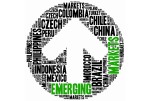A lost decade for emerging markets? (Emerging Market Equity Roundtable – part 1)
A lost decade for emerging markets? (Emerging Market Equity Roundtable – part 1)

Emerging markets have lagged behind the US stock market in recent years. Is that tide turning? That question was central to the first part of the Roundtable organised by Financial Investigator on Emerging Market Equity with seven experts and chair Han Dieperink, CIO at Auréus.
By Manno van den Berg
This is part 1 of the report. Part 2 will follow on Wednesday 18 June, part 3 on Friday 20 June.
|
MODERATOR Han Dieperink, Auréus.
PARTICIPANTS Cemre Demirkazik, Carmignac Weichen Ding, bfinance Thomas Kieselstein, Quoniam Asset Management Samuel Lo, Morningstar Tom Niemans, Goldman Sachs Asset Management Andrea Salvatori, Amundi Ramon Tol, Achmea Investment Management |
Emerging markets are back on investors' radar, if only because of the disruptive avalanche of import tariffs from the White House, where President Trump wants to reduce trade deficits to “make America great again”. But also because stock valuations are starting to look interesting after a prolonged period of relative weakness.
How will emerging markets fare in Trump's new world order? Will we see a second Plaza Accord, which roughly halved the value of the dollar in 1985? What is the impact of a weaker dollar on emerging countries? These and other questions were discussed during the Round Table “Where are the Opportunities in Emerging Market Equity?”. Financial Investigator invited eight experts.
The participants in the Round Table – four in the stately boardroom of De Burcht van Berlage in Amsterdam and four online – agreed on one thing: the United States is playing a dangerous game of poker with the world, with systemic change in the global economy at stake. Whether this will succeed is uncertain. But the fact is that investors can no longer rely on old certainties, such as the US as a safe haven in times of crisis.
Moderator Han Dieperink, Chief Investment Officer at Auréus, immediately stirred things up by asking whether the United States had not behaved like an emerging market in early April, where everything can collapse at once. Normally, the dollar rises and interest rates fall during times of stress, but in April it was exactly the opposite: the dollar fell and interest rates rose because government bonds (and other assets) also fell in value.
That was an unprecedented combination. Is a structural decline of the dollar imminent? Are we heading for a new Plaza Accord?
Thomas Kieselstein: 'I don't expect that. Before the Plaza Accord, the dollar had risen in value by almost 100% in early 1980. The current situation is less extreme. However, the US government seems particularly determined to achieve a lower exchange rate, and this may have been somewhat underestimated by the markets. I expect a weaker dollar, but not to the same extent as in the 1980s.'
Ramon Tol: 'The dollar is likely to weaken. The US has huge budget deficits and a current account deficit. How long can that be sustained? Won't these deficits, combined with Trump's presidency, automatically lead to capital outflows, resulting in a weaker dollar?'
Tom Niemans: 'Recent trade developments have created uncertainty, making it difficult for investors to price in the actual effects. This uncertainty is also affecting consumer and business confidence. So the potential benefits of a weaker dollar could be offset by slower economic growth.'
Cemre Demirkazik: 'The US dollar will weaken further, driven by market forces. We expect interest rate differentials to lead to a weaker dollar – the Fed will cut interest rates in response to the economic slowdown – which will support local currencies in emerging markets and also lead to higher equity valuations there. The dollar remains important, but you could argue that its importance has declined. Look at the debt in emerging markets, which used to be mainly in dollars but is now mostly in local currencies, with a few exceptions, such as Argentina. The traditional correlation between a more accommodative Fed policy, a weakening dollar and subsequently good performance in emerging markets continues to hold true.'
Where will Trump's trade tariffs lead? To a structural regime change? One in which the dollar will be less dominant?
Andrea Salvatori: 'The US government is clearly pushing for a new regime. But Trump is pursuing a lot of goals. One of the reasons the market may have underestimated him is that his ambitions are simply unrealistic. It's not just the scale and impact of what he wants to achieve – some of his goals are downright contradictory. For example, the idea that you can rake in billions in import tariffs to finance tax cuts while at the same time wanting to bring production back home. Local production obviously doesn't generate any income from those tariffs.'
Weichen Ding: 'Trump may indeed want a lot, but it will be difficult to achieve it all. Ultimately, a balance will be struck, but we will have to deal with the unknown consequences of all these decisions and policy measures. So expect a lot of volatility.'
Samuel Lo: 'We can't predict Trump, any more than we can predict President Xi. That's why we need to focus on the fundamentals that drive markets in the long term, such as macroeconomics and reserves. Even if some world leaders want to change the rules of the game, there is a certain way the world works and those rules are difficult to break. Yes, there will be disruptions, but a real regime change? That's very difficult. Change is the only constant in the world, so it also depends on how you define “regime change”.'
Salvatori: 'Perhaps the real regime change will be more of a downward revaluation of the currently dominant US market. If you start producing Nike shoes and iPhones in Texas – which is unlikely – that won't yield a multiple of 30. If global investors adapt to a weaker dollar and an America that is closing itself off and bringing production back home, emerging markets could score better in terms of investor preference and achieve multiple expansion.'
Kieselstein: 'To add to that, we saw huge multiple expansion in the US, while other regions, such as Europe, experienced compression. The underlying reason is that the US is the leader in technology and related services, not in manufacturing. The big question now is whether they will maintain that position. Or will that leadership crumble?'
|
Han Dieperink Han Dieperink is an independent consultant through his company HD Capital & Advisory. He is Chief Investment Officer at Auréus and Senior Advisor at BB Capital, a Dutch private equity investor. He also writes books, columns and a weekly newsletter. Dieperink was Chief Investment Officer at Rabobank until 2019 and held the same position at Schretlen & Co. before 2010. Prior to that, he was an officer in the Royal Netherlands Navy. |
|
Cemre Demirkazik Cemre Demirkazik is Senior Product Specialist, specialising in emerging markets, and co-Head of the Product Specialists team at Carmignac. She joined the company in 2014 as Product Specialist and was appointed Manager of the team in 2024. Prior to that, she worked at Aviva Investors and DeriveXperts. Demirkazik graduated from the Université Paris Dauphine with a Master's degree in Economic and Financial Engineering. |
|
Weichen Ding Weichen Ding is Director in the Equity team at bfinance, specialising in research on equity managers, with a focus on emerging market equity strategies and quantitative strategies. Before joining bfinance, Ding worked for five years as a Research Analyst Manager at Alvarium Investments. He holds an MSc in Economics from University College London and a BSc in Information Security from Fudan University, China. |
|
Thomas Kieselstein Thomas Kieselstein has been providing strategic guidance to Quoniam since 2023, particularly with regard to the investment process. As co-founder and former Chief Investment Officer, he played a crucial role in shaping the company's development. Previously, he worked at DZ Bank and Dresdner Investment Group (now Allianz Global Investors). He holds a degree in Industrial Engineering from the University of Karlsruhe (KIT). |
|
Samuel Lo Samuel Lo is Principal, Manager Research at Morningstar Asia Limited, a subsidiary of Morningstar, Inc. He is part of the cross-border manager research team and focuses on equity strategies in Asia. Before joining Morningstar in 2019, Lo worked as an Equity Research Analyst for two years. He began his career as a Securitisation Analyst at Crédit Agricole CIB. |
|
Tom Niemans Tom Niemans is Executive Director and Co-Head of the External Investing Group (XIG) team in the Netherlands. He has nearly 15 years of experience in the financial sector, including 12 years focusing on manager selection and monitoring and advising on investment portfolios. Niemans is a CFA charterholder and holds a Master's degree in International Business from Maastricht University. |
|
Andrea Salvatori Andrea Salvatori is Head of Emerging Market ESG at Amundi Asset Management and is responsible for portfolio management of Global Emerging Market Equity, Latin America and several ESG-focused equity strategies. He plays a crucial role in integrating ESG factors into investment decisions. Previously, he was Head of Equity Research for Emerging Markets, among other roles. |
|
Ramon Tol Ramon Tol was responsible for setting up, implementing and executing the manager monitoring and selection process at Blue Sky Group. He currently works as Senior Portfolio Manager Equities at Achmea Investment Management. Tol regularly speaks at international conferences on manager selection, monitoring and transition management and publishes regularly in academic journals and economic magazines. |
















